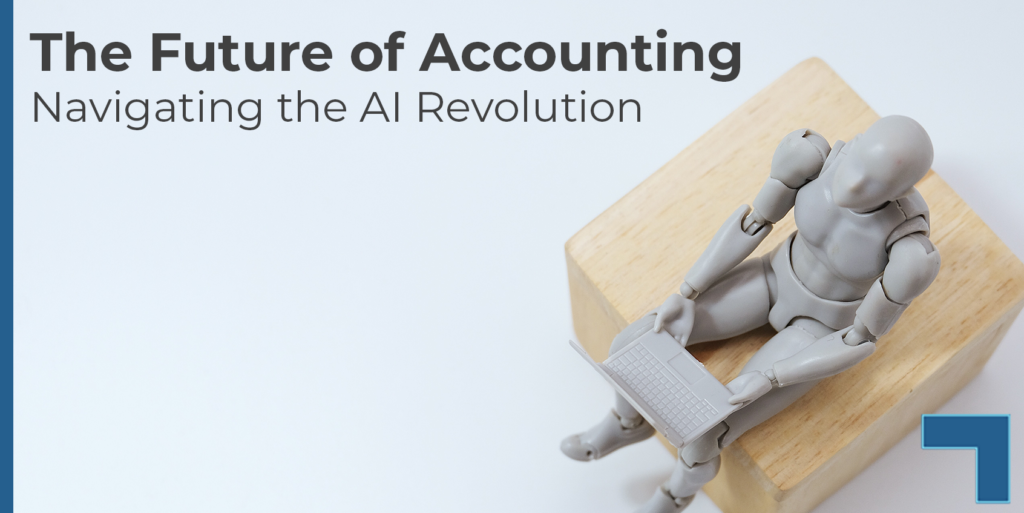
Artificial Intelligence (AI) is revolutionising the accounting profession, bringing forth a wave of transformative changes. From streamlining data analysis to enhancing efficiency and accuracy, AI is empowering accountants to elevate their role in financial management.
The AI revolution has given rise to intelligent machines capable of learning, reasoning, and making informed decisions. AI encompasses various technologies, including machine learning, natural language processing, and robotic process automation. These technologies enable systems to analyse vast amounts of data, extract valuable insights, and automate repetitive tasks that were once manual and time-consuming.
In accounting, the data aspect of AI is particularly significant. Traditionally, accountants relied on manual entry and analysis of financial data. With AI, however, systems can automatically collect and process data, minimizing errors and freeing up accountants’ time for more strategic and analytical tasks. By leveraging AI, accountants can now focus on interpreting financial information, providing valuable insights, and making informed recommendations to support business decisions.
Enhancing Efficiency and Accuracy
AI is revolutionising accounting processes, driving efficiency and accuracy in various areas. For instance, AI-powered software can automate data entry, eliminating the need for manual input and reducing the risk of human errors. These systems can scan and extract relevant information from documents such as invoices, receipts, and bank statements, ensuring accurate and timely recording of financial transactions.
Furthermore, AI algorithms can analyse financial data to identify patterns, trends, and anomalies. This helps accountants in detecting potential fraud or unusual activities, enabling timely intervention and prevention. AI can also assist in automating financial reporting by generating customised reports based on predefined criteria, saving valuable time and resources.
Another area where AI is making significant strides is in the realm of financial forecasting. By analysing historical data, market trends, and other relevant factors, AI algorithms can provide accurate predictions and projections. This empowers accountants to make informed forecasts, support strategic planning, and optimise resource allocation.
Transforming Accounting Practices
AI is transforming the very core of accounting practices, redefining how professionals approach their work. For example, AI-powered tools can automate complex calculations and data analysis, allowing accountants to focus on interpreting results and providing valuable insights. These tools can also streamline the auditing process by identifying potential risks and anomalies, thereby enhancing the accuracy and effectiveness of audits.
AI’s impact is not limited to internal accounting processes. Client-facing aspects such as customer support and advisory services can also be enhanced through AI-powered solutions. Chatbots and virtual assistants can handle routine inquiries, freeing up accountants’ time to address more complex client needs and provide strategic guidance. AI-powered chatbots, such as ChatGPT, can offer instant answers to common accounting questions, improving customer satisfaction and response times.
The Potential of ChatGPT in Accounting
ChatGPT, an advanced language model developed by OpenAI, holds significant potential for the accounting profession. This AI-powered chatbot can engage in natural language conversations, providing accurate and insightful responses to accounting-related queries. Accountants can leverage ChatGPT to gain quick access to information, resolve common accounting issues, and improve overall efficiency.
However, it is essential to recognise the limitations of AI chatbots. While they excel at providing information based on predefined knowledge, they may struggle with complex or nuanced queries that require human judgment and expertise. Therefore, a balance must be struck between utilizing AI chatbots for routine tasks and relying on human accountants for complex scenarios that demand professional judgment.
The integration of Artificial Intelligence (AI) in the accounting profession is driving a significant transformation that accountants must embrace. AI offers numerous benefits, including enhanced efficiency, improved accuracy, and the ability to provide strategic insights. By automating repetitive tasks, AI frees up accountants’ time, allowing them to focus on higher-value activities such as analysis, advisory services, and decision-making.
In this era of AI-driven advancements, accountants who embrace technology and continually update their skills will be well-positioned to thrive. By leveraging AI’s capabilities, accountants can elevate their role from traditional number-crunching to strategic advisors, providing valuable insights and contributing to the success of their organizations. Embracing the AI revolution in accounting is not just an option—it’s a necessity for accountants to remain relevant and maximise their impact in the ever-evolving business landscape.



